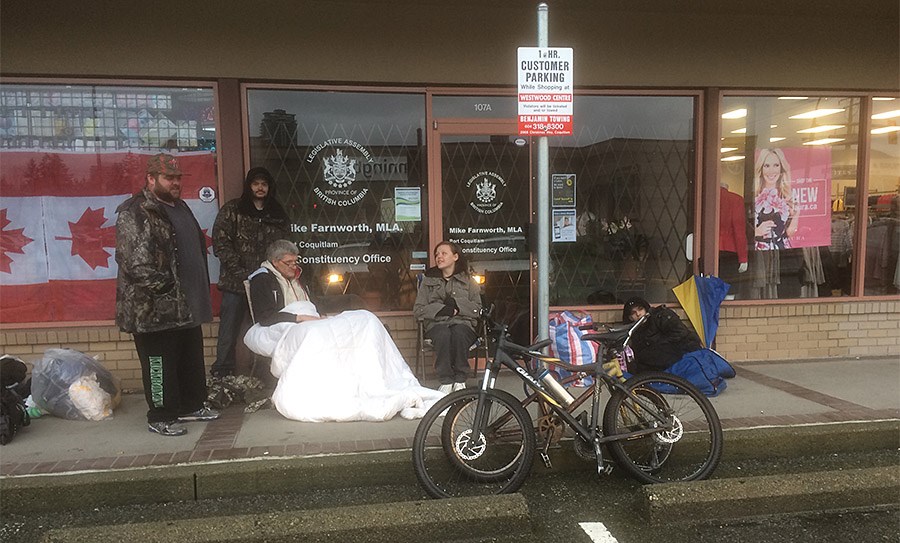A group of homeless men and one pregnant woman held a protest outside a local MLA's office Thursday morning after they were told to leave the Coquitlam homeless shelter because the weather has warmed up.
As many as 17 people were ejected from the shelter at 3030 Gordon Ave, Wednesday when the Emergency Weather Response (EWR) was lifted under BC Housing rules that fund temporary shelter beds when temperatures dip below zero.
Some of the evictees turned up at PoCo MLA Mike Farnworth's office, saying they didn't think it was fair that they were being turfed out, said Glenn Pollock, the constituency office manager as well as a PoCo city councillor.
"I have nothing but good things to say about the shelter," Pollock said, "[but] they [those who were evicted] don't understand BC Housing has its rules."
Coquitlam RCMP sent the individuals on their way at the request of the property manager, Pollock said, and the pregnant woman has found space at a woman's shelter. Farnworth, who was in Victoria at the legislature, is expected to raise the issue, although the shelter could re-open its EWR beds this weekend if temperatures dip.
Extending the extreme weather shelter so it's open daily from mid-October to mid-March might be one solution, suggested Farnworth, but it would require more funding from BC Housing.
"Some areas where [they do this] they call it a heat shelter, [and] you're not out in the rain, and I think there would be fewer people on the street seeking shelter."
According to shelter manager Adam Prytuluk, 22 people were being housed in temporary beds when the EWR ended and although five were found beds — three at a recovery home and two in market housing — the remainder had no place to go and were asked to leave, with about a week's notice.
"Throughout the EWR, that's sort of the first talking point we have with people this is only while the extreme weather lasts," Prytuluk said.
But he agreed some of the problem relates to the lack of low-barrier shelter beds for people with addiction issues and the ongoing market rental crisis, which is making it difficult for people to find a place to rent.
"We don't have a magic wand. We don't see how you can find a place for $375 month [shelter allowance] when a one-bedroom is $650."
During one of the coldest winters in recent memory, the shelter's EWR beds were opened for nearly 11 weeks, an unusual situation, said Sandy Burpee, who monitors the weather and announces the emergency shelter opening, and he said he can sympathize with those who were evicted.
"It's still going to be unpleasant," he said.
The purpose of the EWR is to save people from the effects of extreme cold. "The trigger temperature is 0 degree celsius," Burpee told The Tri-City News. "[In] a couple of municipalities, it's actually minus 2."
The shelter opened in December 2015 with 30 regular shelter beds — private rooms with single beds— and 30 transitional apartments for longer stays, and Prytuluk said turnover in the shorter-stay beds is steady, with about 35% of clients getting space in a recovery centre and 30% finding market housing.
But the average length of stay is still 60 days, leaving a number of people on the street who might not be able to find a room.
Next week's regional homeless count is expected to provide a clearer picture of the Tri-Cities' homeless population.



